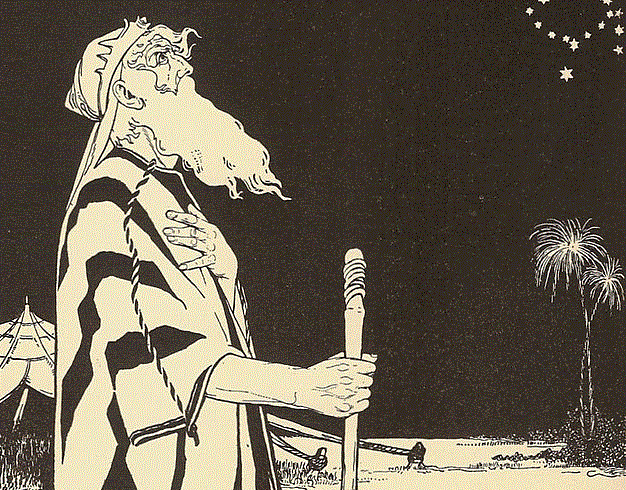
Notarikon in the Torah
Abbreviations and acronyms are familiar features of rabbinic literature, but they are rare in the Torah itself. Even so, the Sages observed that a few examples of notarikon (Aramaic for ‘acronym’) are embedded within the Biblical text.
The first and clearest instance appears in the new name that God bestows upon Abram:
No longer shall you be called Abram. Your name shall be Abraham, for I have made you the father of many nations. (Gen. 17:5)
With this change, God endowed Abram with a new identity and mission.
The name Avraham is short for av hamon goyim, “the father of many nations.”
Yet the Talmud (Shabbat 105a) was not satisfied with this simple explanation. While the Torah presents Avraham as a syllabic abbreviation of av hamon, the Sages expanded it into a full notarikon. Each of the six Hebrew letters of av hamon (אב המון) reveals a different facet of Abraham’s spiritual stature and influence in the world:
- Aleph for Av: you are a father to the nations.
- Bet for Bachur: you are chosen among the nations.
- Hei for Haviv: you are beloved among the nations.
- Mem for Melech: you are a king over the nations.
- Vav for Vatik: you are exemplary among the nations.
- Nun for Ne’eman: you are faithful among the nations.
Of all the names in the Torah, why should Abraham’s be an abbreviation? And why did the Sages choose to expand this abbreviation letter by letter?
Abraham’s Dual Influence
It would be a mistake to regard a notarikon as merely a homiletic or mnemonic device. It is, rather, a window into levels of meaning in the text. In addition to a literal understanding of the words, there is a wealth of profound ideas contained within the written text. This is similar to the workings of an acronym, where from each letter we extrapolate an entire word.
What is striking is that the Sages chose the name Abraham for such an interpretation. Why this name, of all others?
Abraham’s life-mission was to found the Jewish people. All three patriarchs, the Sages taught, are called “Israel” (Breishit Rabbah 63:3). This is because their primary goal was to establish a nation that would be a “kingdom of priests and a holy nation.”
Yet Abraham’s influence did not end there. He had a powerful impact on all nations, introducing a world steeped in idolatry to the idea of One God.
The Sages analyzed Abraham’s influence, noting that it incorporated six qualities, corresponding to the six letters of av hamon.
Thus, like a notarikon, Abraham’s influence
was on two planes. His explicit life-goal was to establish
a holy nation. But Abraham had an additional level of
influence, as he disseminated the ideals of
monotheism and morality among all peoples.
Six Dimensions of Abraham’s Influence
Each letter of the phrase av hamon reveals a different facet of Abraham’s influence on humanity.
He was an Av, a spiritual father and mentor to many people. Abraham was a source and model for true knowledge of God in the world.
His teachings were Bachur — chosen and pure, far removed from the jumble of pagan superstitions and myths. And because truth has a beauty of its own, his faith was Haviv — beloved. Its inner radiance drew hearts toward it; people felt its authenticity and were inspired by its moral grace.
Because of his stature and integrity, Abraham was revered as a Melech, a king. “A prince of God are you among us,” his neighbors told him (Gen. 23:6). Like a king on the battlefield, he led the fight for truth in a world shrouded in darkness and ignorance, victorious by virtue of the truth of his vision.
He was also Vatik, respected for his integrity and unwavering principles. His Torah was no abstract philosophy. It was a way of life, refining conduct and character alike, elevating the everyday through holiness, morality, and justice.
And finally, Abraham was Ne'eman, a man of steadfast faith. As the Torah records, “He believed in God, and it was counted to him as righteousness” (Gen. 15:6).
Abraham and his revolutionary faith kindled a nascent spark of faith among the nations. This flame of faith continues to illuminate the paths of many nations — a flame that will be elevated in the future into a pure and perfected faith in God.
(Adapted from Ein Eyah vol. IV, p. 264)
Illustration image: ‘Abraham contemplates the Stars’ (Ephraim Moshe Lilien, 1908)